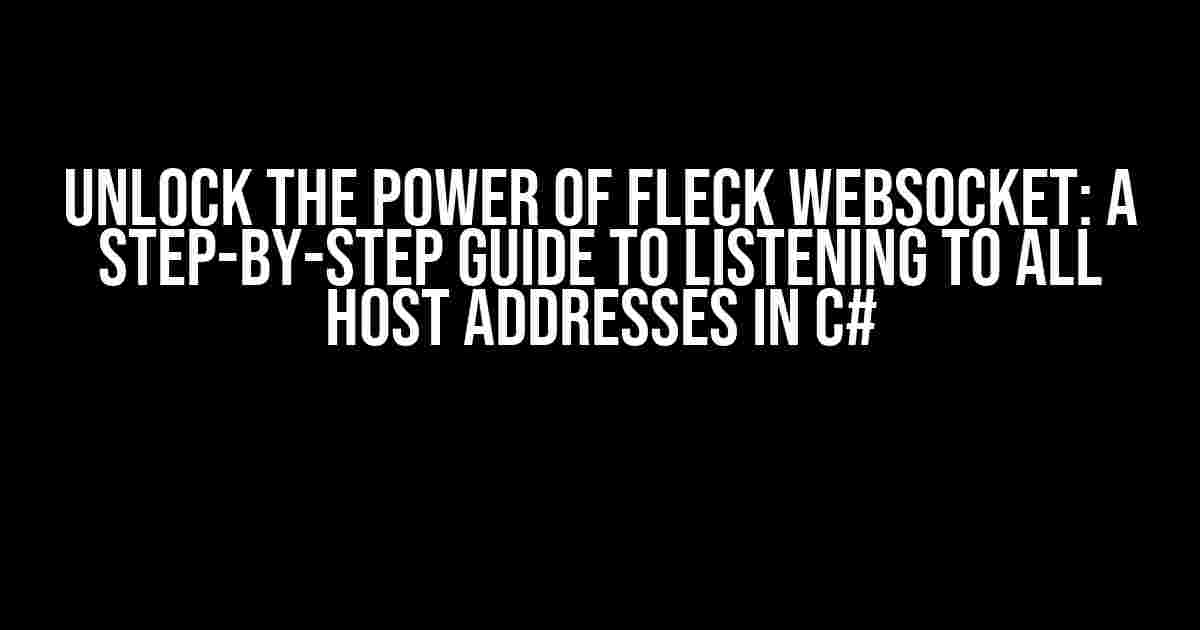Are you tired of dealing with the limitations of traditional socket programming in C#? Do you want to create real-time web applications that can efficiently handle multiple client connections? Look no further! In this comprehensive guide, we’ll show you how to use Fleck WebSocket to listen to all host addresses in C# and unlock the full potential of your applications.
What is Fleck WebSocket?
Fleck WebSocket is a popular, open-source C# library that allows you to create real-time web applications using the WebSocket protocol. It provides a simple, yet powerful way to establish bi-directional communication between a client and a server, enabling you to build fast, scalable, and efficient applications.
Why Use Fleck WebSocket?
So, why should you choose Fleck WebSocket over traditional socket programming or other WebSocket libraries? Here are some compelling reasons:
- Easy to use: Fleck WebSocket provides a straightforward API that makes it easy to integrate WebSockets into your C# applications.
- High-performance: Fleck WebSocket is optimized for performance, enabling you to handle a large number of client connections with ease.
- Scalable: With Fleck WebSocket, you can scale your applications to meet the needs of your growing user base.
- Flexible: Fleck WebSocket supports a wide range of protocols, including WebSocket, TCP, and UDP.
Setting Up Fleck WebSocket in C#
To get started with Fleck WebSocket, you’ll need to install the Fleck NuGet package in your C# project. You can do this using the following command in the NuGet Package Manager Console:
Install-Package Fleck
Once you’ve installed the package, you can create a new instance of the WebSocket server:
using Fleck;
var allSockets = new Dictionary<IWebSocketConnection, WebSocketConnection>();
var socketServer = new WebSocketServer("ws://127.0.0.1:9300");
socketServer.Start(socket =>
{
allSockets.Add(socket, socket);
socket.OnOpen = () => Console.WriteLine("Open!");
socket.OnClose = () => Console.WriteLine("Close!");
socket.OnMessage = (message) => Console.WriteLine("Message!");
});
Listening to All Host Addresses
To listen to all host addresses using Fleck WebSocket, you’ll need to configure the WebSocket server to bind to all available network interfaces. You can do this by specifying the IP address `0.0.0.0` or `::` (for IPv6) when creating the WebSocket server instance:
var socketServer = new WebSocketServer("ws://0.0.0.0:9300");
This will enable the WebSocket server to listen to all incoming connections on port 9300, regardless of the host address.
Handling WebSocket Connections
Once you’ve set up the WebSocket server, you can start handling WebSocket connections. Here are some common scenarios:
Handling New Connections
To handle new WebSocket connections, you can use the `OnOpen` event:
socket.OnOpen = () =>
{
Console.WriteLine("New connection established!");
// Perform any necessary initialization or authentication
};
Handling Incoming Messages
To handle incoming messages from connected clients, you can use the `OnMessage` event:
socket.OnMessage = (message) =>
{
Console.WriteLine("Received message: " + message);
// Process the incoming message
};
Handling Errors and Disconnections
To handle errors and disconnections, you can use the `OnError` and `OnClose` events, respectively:
socket.OnError = (exception) =>
{
Console.WriteLine("Error occurred: " + exception.Message);
// Handle the error
};
socket.OnClose = () =>
{
Console.WriteLine("Connection closed!");
// Perform any necessary cleanup
};
Best Practices and Optimization Techniques
To get the most out of Fleck WebSocket, here are some best practices and optimization techniques to keep in mind:
Use Connection Pooling
To improve performance, consider using connection pooling to reuse existing WebSocket connections. This can reduce the overhead of creating new connections and improve overall performance.
Optimize Message Handling
To optimize message handling, consider using a message queue or buffer to handle incoming messages. This can help reduce the load on your application and improve responsiveness.
Monitor and Analyze Performance
To ensure optimal performance, monitor and analyze your application’s performance using tools like performance counters, logging, and profiling. This can help identify bottlenecks and areas for improvement.
Common Issues and Troubleshooting
Here are some common issues you may encounter when using Fleck WebSocket, along with some troubleshooting tips:
Connection Refused or Timeout
If you’re experiencing connection refused or timeout errors, check the following:
- Ensure that the WebSocket server is running and listening on the correct port.
- Verify that the client is connecting to the correct host address and port.
- Check for any firewall or network configuration issues that may be blocking the connection.
Messages Not Being Received
If messages are not being received by the client or server, check the following:
- Verify that the WebSocket connection is established successfully.
- Check the message handling logic to ensure that messages are being processed correctly.
- Verify that the WebSocket connection is not being closed prematurely.
| Issue | Troubleshooting Steps |
|---|---|
| Connection Refused or Timeout | Verify server and client configuration, check firewall and network configuration |
| Messages Not Being Received | Verify WebSocket connection establishment, check message handling logic, verify connection closure |
Conclusion
In this comprehensive guide, we’ve shown you how to use Fleck WebSocket to listen to all host addresses in C#. By following these steps and best practices, you can create fast, scalable, and efficient real-time web applications that meet the needs of your growing user base. Remember to monitor and analyze performance, troubleshoot common issues, and optimize your application for maximum performance.
With Fleck WebSocket, the possibilities are endless! Unlock the full potential of your C# applications today.
Frequently Asked Question
Get ready to level up your C# skills and learn how to use Fleck Websocket to listen to all host addresses!
Q1: What is Fleck Websocket and how does it help me listen to all host addresses?
Fleck Websocket is a C# library that provides a simple and efficient way to establish real-time communication between a server and multiple clients. By using Fleck, you can create a WebSocket server that listens to all host addresses, allowing you to connect with clients from different origins.
Q2: How do I create a Fleck Websocket server that listens to all host addresses?
To create a Fleck Websocket server that listens to all host addresses, you need to create an instance of the FleckWebSocket class and specify the IP address and port number you want to listen on. For example, you can use the following code: `var allAddresses = IPAddress.Any; var server = new WebSocketServer(allAddresses, 8181);`. This will create a server that listens to all available network interfaces on port 8181.
Q3: How do I handle incoming WebSocket connections from different host addresses?
To handle incoming WebSocket connections from different host addresses, you need to implement a callback method that will be called whenever a new connection is established. You can use the `OnOpen` event to handle incoming connections and extract the remote endpoint address from the WebSocketConnectionInfo object.
Q4: How do I send messages to all connected clients from different host addresses?
To send messages to all connected clients from different host addresses, you can use the `Send` method of the WebSocketConnection object. You can iterate through the list of connected clients and send a message to each one individually. Alternatively, you can use a broadcasting mechanism to send the message to all connected clients at once.
Q5: Are there any security considerations I need to keep in mind when using Fleck Websocket to listen to all host addresses?
Yes, when using Fleck Websocket to listen to all host addresses, you need to ensure that you have implemented proper security measures to prevent unauthorized access and data tampering. This includes using secure protocols such as WSS (WebSocket over SSL/TLS), validating incoming data, and implementing authentication and authorization mechanisms.


